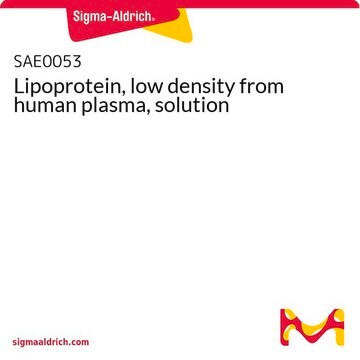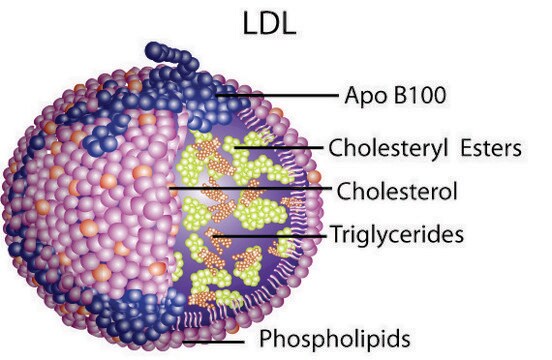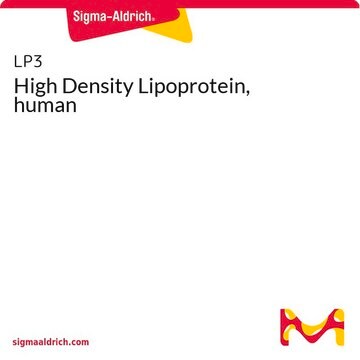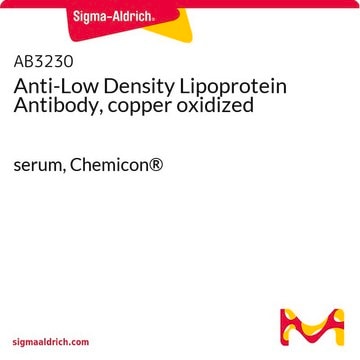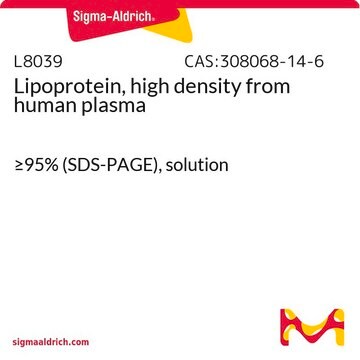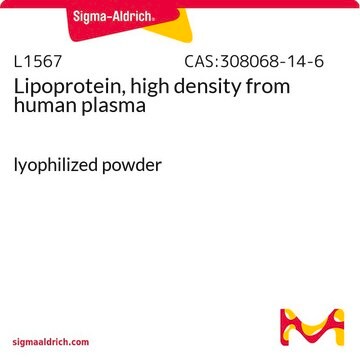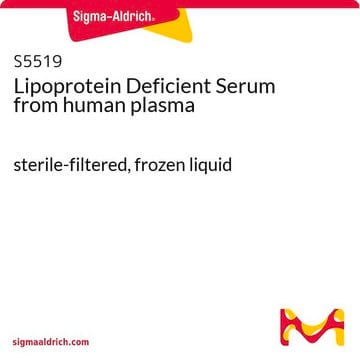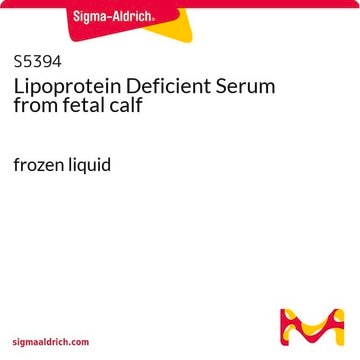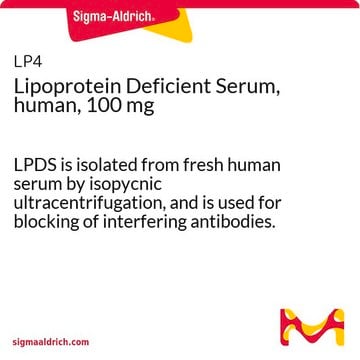437644
Lipoproteins, Low Density, Human Plasma
Synonym(s):
LDL
Sign Into View Organizational & Contract Pricing
All Photos(1)
About This Item
UNSPSC Code:
12352202
NACRES:
NA.25
Recommended Products
assay
≥95% (of total lipoprotein content, electrophoresis)
Quality Level
form
liquid
manufacturer/tradename
Calbiochem®
storage condition
do not freeze
protect from light
shipped in
wet ice
storage temp.
2-8°C
General description
A 10 mg vial contains ~2 mg of protein.
Native low density lipoproteins from human plasma. Cholesterol-carrier lipoprotein responsible for delivery of lipids (cholesterol) from liver to tissues. (Composition: 78-81% lipid; 19-22% protein. Note: 10 mg vial contains 2 mg of protein.)
Packaging
Please refer to vial label for lot-specific concentration.
Warning
Toxicity: Standard Handling (A)
Physical form
In 150 mM NaCl, 0.01% EDTA, pH 7.4.
Preparation Note
Prepared from plasma that has been shown by certified tests to be negative for HBsAg and for antibodies to HIV and HCV.
Reconstitution
This product does not contain preservatives, so it is recommended that it be used under a laminar flow hood. Following initial use, this product is stable for 1 week at 2-8°C.
Other Notes
Foster, J.D., et al. 1993. Endocrinology132, 337.
Retsky, K.L., et al. 1993. J. Biol. Chem. 268, 1304.
Fielding, C.J. 1992. FASEB J. 6, 3162.
Retsky, K.L., et al. 1993. J. Biol. Chem. 268, 1304.
Fielding, C.J. 1992. FASEB J. 6, 3162.
Legal Information
CALBIOCHEM is a registered trademark of Merck KGaA, Darmstadt, Germany
Storage Class
12 - Non Combustible Liquids
wgk_germany
nwg
flash_point_f
Not applicable
flash_point_c
Not applicable
Certificates of Analysis (COA)
Search for Certificates of Analysis (COA) by entering the products Lot/Batch Number. Lot and Batch Numbers can be found on a product’s label following the words ‘Lot’ or ‘Batch’.
Already Own This Product?
Find documentation for the products that you have recently purchased in the Document Library.
Customers Also Viewed
Jiawei Chen et al.
The Biochemical journal, 393(Pt 1), 255-265 (2005-09-22)
LOX-1, a receptor for ox-LDL (oxidized low-density lipoprotein), has recently been determined to play a critical role in the progression of atherosclerosis. LOX-1 expression (mRNA and protein) has been shown to be up-regulated by pro-atherogenic stimuli, such as ox-LDL and
Se-Hyun Oh et al.
FASEB journal : official publication of the Federation of American Societies for Experimental Biology, 33(6), 7301-7314 (2019-03-13)
Hypercholesterolemia is reported to increase reactive oxygen species (ROS) and to promote breast cancer progression. ROS play an important role in tumor biology, and xanthine oxidase (XO) is an enzyme that generates ROS. The effects of febuxostat (FBX), an XO
Eui-Jung Park et al.
FASEB journal : official publication of the Federation of American Societies for Experimental Biology, 34(2), 3379-3398 (2020-01-11)
Aquaporin-5 (AQP5) plays a role in breast cancer cell migration. This study aimed to identify AQP5-targeting miRNAs and examine their effects on breast cancer cell migration through exosome-mediated delivery. Bioinformatic analyses identified miR-1226-3p, miR-19a-3p, and miR-19b-3p as putative regulators of
Yaw Asare et al.
Frontiers in physiology, 11, 673-673 (2020-07-07)
Atherogenesis and arterial remodeling following mechanical injury are driven by inflammation and mononuclear cell infiltration. The binding of immune complexes (ICs) to immunoglobulin (Ig)-Fc gamma receptors (FcγRs) on most innate and adaptive immune cells induces a variety of inflammatory responses
Brett M Stevens et al.
STAR protocols, 2(1), 100248-100248 (2021-01-14)
Isolation of leukemia stem cells presents a challenge due to the heterogeneity of the immunophenotypic markers commonly used to identify blood stem cells. Several studies have reported that relative levels of reactive oxygen species (ROS) can be used to enrich
Our team of scientists has experience in all areas of research including Life Science, Material Science, Chemical Synthesis, Chromatography, Analytical and many others.
Contact Technical Service